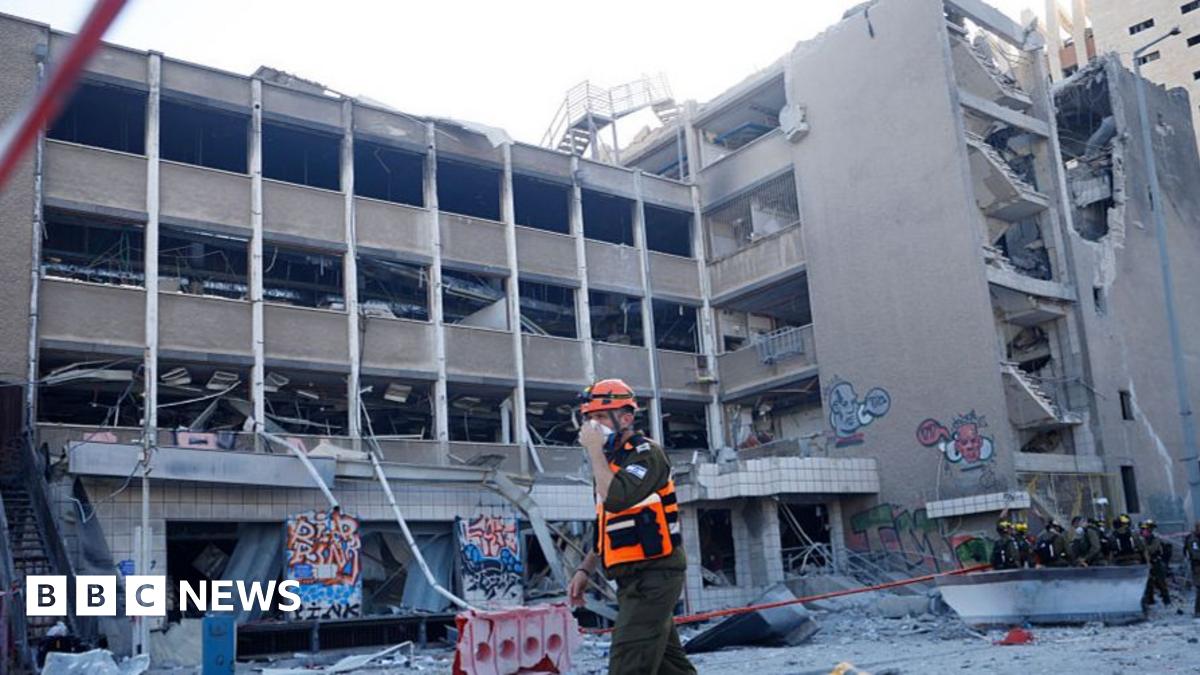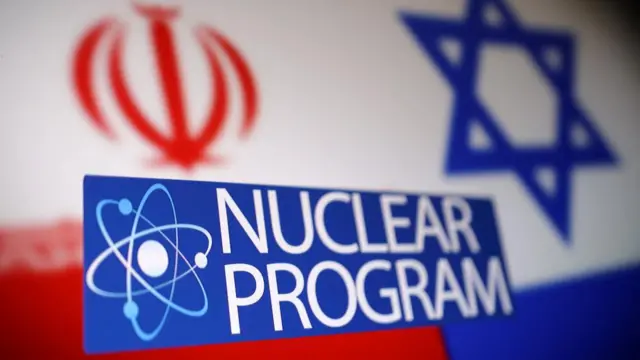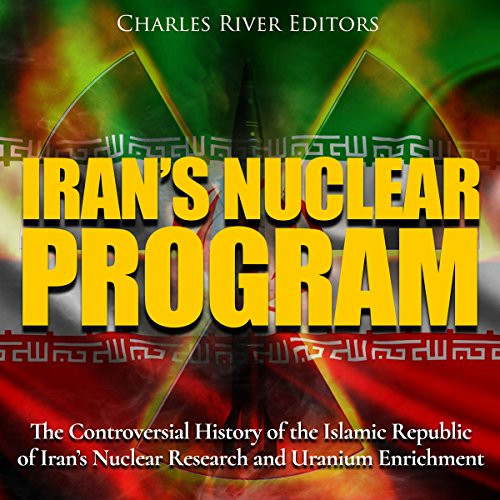You are using an out of date browser. It may not display this or other websites correctly.
You should upgrade or use an alternative browser.
You should upgrade or use an alternative browser.
Official Israel Vs. Iran 2025 thread: Updates on first post! Trump calls for Iranian regime change. "Make Iran Great Again!"
- Thread starter Afro
- Start date
More options
Who Replied?ORDER_66
I dont care anymore 2026
Brink of WW3 with multiple nuclear powers involved. Very messy indeed.
this is either let israel burn or get involved and escalate WW3...
 it shouldn't be a hard choice
it shouldn't be a hard choicehttps://www.cnn.com/world/live-news/israel-iran-conflict-06-20-25-intl-hnk#cmc4ymcwv00213b6n4aumym9d
26 min ago
Nearly two dozen people were wounded in parts of Israel on Friday, emergency services said, after Iran unleashed a fresh barrage of missiles.
At least 23 people were injured, Israel’s Magen David Adom (MDA) said. A 16-year-old boy, and two men aged 54 and 40, were among those seriously injured with shrapnel. In the northern city of Karmiel, a woman died after she suffered a heart attack inside a shelter, the MDA added.
Paramedics and eyewitnesses described scenes of people bleeding in the streets, after they were dispatched to several neighborhoods in northern Israel.
“We heard a very loud noise and felt a blast wave. When I exited the shelter, I saw that the windows in my house were shattered, and there was a lot of broken glass,” Ahmed Zidan said in an MDA press release.
“I saw heavy smoke and massive destruction in the building near the parking area that was hit by the rocket,” Zidan added.
Iran said the latest attack targeted “military objectives, defense industries, and command centers” in Israel, a spokesperson for the country’s revolutionary guard said, according to state media.
26 min ago
Injuries rise in Israel after latest Iranian attack, emergency services say
From CNN’s Tamar MichaelisNearly two dozen people were wounded in parts of Israel on Friday, emergency services said, after Iran unleashed a fresh barrage of missiles.
At least 23 people were injured, Israel’s Magen David Adom (MDA) said. A 16-year-old boy, and two men aged 54 and 40, were among those seriously injured with shrapnel. In the northern city of Karmiel, a woman died after she suffered a heart attack inside a shelter, the MDA added.
Paramedics and eyewitnesses described scenes of people bleeding in the streets, after they were dispatched to several neighborhoods in northern Israel.
“We heard a very loud noise and felt a blast wave. When I exited the shelter, I saw that the windows in my house were shattered, and there was a lot of broken glass,” Ahmed Zidan said in an MDA press release.
“I saw heavy smoke and massive destruction in the building near the parking area that was hit by the rocket,” Zidan added.
Iran said the latest attack targeted “military objectives, defense industries, and command centers” in Israel, a spokesperson for the country’s revolutionary guard said, according to state media.

Israel-Iran live updates: UK to withdraw embassy staff from Tehran as Iran launches new strikes on Israel
Meanwhile European foreign ministers are holding talks with Iran in Geneva after Donald Trump set a two-week timeline for US action.
 www.bbc.com
www.bbc.com

Israel-Iran live updates: UK to withdraw embassy staff from Tehran as Iran launches new strikes on Israel
Meanwhile European foreign ministers are holding talks with Iran in Geneva after Donald Trump set a two-week timeline for US action.
Diplomatic talks ongoing, but who's said what?

Image source, Reuters
Image caption, A group of European foreign ministers briefly met ahead of talks with their Iranian counterpart
As European diplomatic talks with Iran continue in Geneva, let's take a moment to look back at what was said before they began.
French President Emmanuel Macron said France and its European allies will present Iran with a diplomatic proposal to end the conflict with Israel, but Iran "must show willingness" - we've broken down the four main components of his proposal.
The UK's Foreign Secretary David Lammy said "a window now exists within the next two weeks to achieve a diplomatic solution", after US President Donald Trump said he would decide whether to join Israeli strikes on Iran within a fortnight.
Israel’s ambassador to the UN in Geneva, Daniel Meron, said he expects European foreign ministers to demand a "complete rollback" of Iran's nuclear programme.
Earlier, Iran's foreign minister Abbas Araghchi said his country won't enter negotiations with the US until Israeli strikes stop, state media reports.
While the talks in Geneva continue, so does the exchange of fire between Israel and Iran - with Israel hit by a new round of Iranian strikes this afternoon.
We're waiting to hear more from the diplomatic talks in Geneva and will bring you the latest developments as we get them.
@Sccit aka The Diddler on the roof denied any Jewish involvement in the trans Atlantic slave trade. So if we doin that. That Nazi shyt can be ducktales too. Them cac shooters were nothing more than CAC shooters. Their only affiliation to any nazi groups was some 4**** type shyt.
Report me or whatever.
Do What Thou Wilt
Did you call that fakkit out ?
Tighten ya cape
I DIDNT DENY ANY INVOLVEMENT .. LITERALLY EVERY GROUP OF PEOPLE WAS INVOLVED INCLUDING BLACK FOLKS
WHAT I SAID IS THAT JEWS PLAYING A LARGE ROLE WAS AN ANTI-SEMITIC TROPE WHICH I DEBUNKED WIT DATA
AND U STILL CAPIN FOR THOSE WHO ARE RESPONSIBLE FOR THE BIGGEST SLAVE TRADE OF BLACK PEOPLE IN HISTORY (STILL GOIN ON), WHICH IS SOME EMBARRASSING SHIIT
Posting hitler in response to him is in bad taste and shouldn’t be on this site, imo
That’s like posting a gif of the KKK to trigger him, cuz they hate Jews and lynched at least one Jew. Remember the Buffalo shooter was a nazi as was the Charleston church shooter, whose anniversary just passed. They target us just as they do Jews, it’s in poor taste and should be called out on a forum with a lot of black posters.
Neo nazis came to my city to intimidate a historically black neighborhood earlier this year. Let’s not get too comfortable posting hitler in jest. Think before you post, let’s not contribute the same poison Nazis and zionists perpetuate.
I MEAN IT KINDA GOES IN LINE WIT CHEERING ON THE PEOPLE WHO ARE DIRECTLY RESPONSIBLE FOR THE ISLAMIC SLAVE TRADE

A LOT OF DERRANGED ONLINE INCELS HERE

Israel-Iran live updates: UK to withdraw embassy staff from Tehran as Iran launches new strikes on Israel
Meanwhile European foreign ministers are holding talks with Iran in Geneva after Donald Trump set a two-week timeline for US action.
 www.bbc.com
www.bbc.com

Israel-Iran live updates: UK to withdraw embassy staff from Tehran as Iran launches new strikes on Israel
Meanwhile European foreign ministers are holding talks with Iran in Geneva after Donald Trump set a two-week timeline for US action.
Why can't Iran have nuclear weapons if other countries can

Raffi Berg
Middle East digital editor

Image source, Reuters
Only a handful of countries have nuclear weapons: the UK, US, Russia, China, France, India, Pakistan and North Korea. Israel is widely believed to have them but neither confirms nor denies this.
So, why can some countries have them and others can't?
The answer lies in a 1968 pact called the Treaty on the Non-Proliferation of Nuclear Weapons (NPT).
It says countries can have civilian nuclear programmes, but that no more countries should get nuclear weapons than already have them. The NPT is legally binding and the vast majority of countries signed up to it - including Iran.
However, Israel, India, Pakistan and South Sudan have not signed it, and North Korea has since pulled out.
India and Pakistan were not recognised as nuclear weapon states when the treaty began and they would be required to disarm if they joined it now. South Sudan is a relatively new country with no nuclear programme.
Israel has not signed because it pursues a policy of nuclear ambiguity as a tactic against foes and does not allow inspections of its nuclear facilities, which would be required under the NPT.
Iran, Arab countries and others have long demanded that Israel be pressured into disarming and being transparent about its nuclear programme, viewing Israel's supposed arsenal as a source of regional tension and a threat.
Iran has always denied seeking nuclear weapons and does not possess any, though many countries are not convinced by Iran's claim of peaceful intentions.
In 2002 it was discovered to have had a secret nuclear programme not allowed under the NPT, triggering a years-long crisis which in large part led to today's events.
-------------------
Afro's Addition:

Iran's Nuclear Program: A History of Controversy and Concerns
Explore the complex history of Iran's nuclear program, from its origins to the present day, including international concerns and efforts to address them.
The IAEA Investigation
In 2002, the National Council of Resistance of Iran (NCRI) exposed the existence of an undisclosed uranium enrichment facility in Natanz, leading to emerging concerns about Iran's nuclear program.[54][55] In 2003, after the Iranian government formally acknowledged the facilities, the Atomic Energy Agency inspected them, finding that they had a more advanced nuclear program than had previously been anticipated by U.S. intelligence.[56]
After public allegations about Iran's previously undeclared nuclear activities, the IAEA launched an investigation that concluded in November 2003 that Iran had systematically failed to meet its obligations under its NPT safeguards agreement to report those activities to the IAEA, although it also reported no evidence of links to a nuclear weapons program. The IAEA Board of Governors delayed a formal finding of non-compliance until September 2005, and reported that non-compliance to the Security Council in February 2006. After the Board of Governors reported Iran's noncompliance with its safeguards agreement to the Security Council, the Council demanded that Iran suspend its enrichment programs. The Council imposed sanctions after Iran refused to do so. A May 2009 US Congressional Report suggested "the United States, and later the Europeans, argued that Iran's deception meant it should forfeit its right to enrich, a position likely to be up for negotiation in talks with Iran."[64]

Iran missiles strike Israel as foreign minister meets European officials
Anti-Israel protesters take to streets of Iranian cities as foreign minister due to meet European officials.
1h ago
(14:35 GMT)
US issues new Iran-related sanctions
The US Treasury has published a list of sanctions to be placed on specifically designated individuals.
Several individuals listed are affiliated directly with the Islamic Revolutionary Guard Corps, according to the Treasury’s website.

Iran missiles strike Israel as foreign minister meets European officials
Anti-Israel protesters take to streets of Iranian cities as foreign minister due to meet European officials.
1h ago
(14:40 GMT)
Photos: Aftermath of Iranian missile attack on Haifa

Emergency staff work at an impact site in Israel’s Haifa after an Iranian missile attack [Florion Goga/Reuters]



Iran missiles strike Israel as foreign minister meets European officials
Anti-Israel protesters take to streets of Iranian cities as foreign minister due to meet European officials.
1h ago
(14:45 GMT)
Radioactivity level outside Natanz site unchanged, normal after Israeli attacks: IAEA chief
Rafael Grossi, director general of the International Atomic Energy Agency (IAEA), has spoken at a meeting of the UN Security Council in New York.
Here are some of his comments:
- The Natanz enrichment site contains two facilities. The first is the main fuel enrichment plant. The initial attacks on June 13 targeted and destroyed electricity infrastructure at the facility, including an electrical substation, the main electric power supply building, an emergency power supply and back-up generators.
- On the same day, the main cascade hall appears to have been attacked using ground-penetrating munitions.
- The second facility at Natanz is the pilot fuel enrichment plant. It consists of above-ground and underground cascade halls. On the 13th of June, the above-ground part was functionally destroyed and the strikes on the underground cascade halls were seriously damaged.
- The level of radioactivity outside the Natanz site has remained unchanged and at normal levels, indicating no external radiological impact on the population or the environment there.
- However, within the Natanz facility, there is both radiological and chemical contamination.
- The radiation poses a significant danger if inhaled or digested. Its risk can be effectively managed with appropriate protective measures, such as using respiratory devices.

Iran missiles strike Israel as foreign minister meets European officials
Anti-Israel protesters take to streets of Iranian cities as foreign minister due to meet European officials.
1h ago
(15:05 GMT)
Attack at Iran’s Bushehr nuclear power plant would have most ‘serious’ consequences: IAEA
Here are some of Grossi’s concluding remarks at the Security Council, which we have been reporting on:
- Bushehr nuclear power plant is where the consequences of an attack could be most serious. It is an operating nuclear power plant, and as such, it hosts thousands of kilogrammes of nuclear material.
- Countries of the region have reached out directly to me over the past few hours to express their concerns, and I want to make it absolutely and completely clear that, in case of an attack on the Bushehr nuclear power plant, a direct hit would result in a very high release of radioactivity to the environment.
- Similarly, a hit that disables the only two lines supplying electrical power to the plant could cause its reactor core to melt, which could result in a high release of radioactivity to the environment.
- In their worst case, both scenarios would necessitate protective actions, such as evacuations and sheltering of the population, or the need to take stable iodine with a reach extending to distances from a few to several hundred kilometres. Radiation monitoring would need to cover distances of several hundred kilometres, and food restrictions may need to be implemented.
- Any action against the Tehran nuclear research reactor could also have severe consequences, potentially for large areas of the city of Tehran and its inhabitants.
- Armed attack on nuclear facilities should never take place and could result in radioactive releases with great consequences within and beyond the boundaries of the state which has been attacked. I, therefore, again call for maximum restraint.

Iran missiles strike Israel as foreign minister meets European officials
Anti-Israel protesters take to streets of Iranian cities as foreign minister due to meet European officials.
53m ago
(15:20 GMT)
Israel has shown ‘blatant disregard’ for a diplomatic solution: Russia’s UN ambassador
Here is a translation of some of the Russian UN ambassador Vasily Nebenzya’s statements at the Security Council.
- Iranian peaceful civilian nuclear facilities continue to be targeted, and this is liable to plunge us into a hitherto unseen nuclear catastrophe.
- The UN Security Council … must provide an objective assessment of the situation and devise an appropriate solution.
- It is Israel which attacked Iran on the eve of the latest planned round of indirect talks between Washington and Tehran.
- Israel not only demonstrated blatant disregard for the efforts that have been undertaken to seek a diplomatic solution to issues around the Iranian nuclear programme but also demonstrated contempt for its key ally, the United States, which, up until recently, had been declaring an intent to reach a compromise solution.
- The nuclear facilities and installations in this country are under the safeguards of the IAEA and are subject to continuous and rigorous verification.
- Israel has disregarded the assessments of the specialist international agency, having, on its own authority, single-handedly, decided to carry out strikes against a sovereign country with no regard for the UN Charter.

Iran missiles strike Israel as foreign minister meets European officials
Anti-Israel protesters take to streets of Iranian cities as foreign minister due to meet European officials.
48m ago
(15:25 GMT)
US envoy to UN says Iran ‘must abandon nuclear ambitions’
Dorothy Camille Shea, the US ambassador to the UN, has again blamed Iran for the unfolding conflict, saying the country should have agreed to a deal “that would have prevented them from ever obtaining a nuclear weapon”.
Iran has repeatedly denied seeking nuclear arms. The IAEA – the UN’s nuclear agency – and the US intelligence community have said they found no evidence that the Iranian government was building one.
“While the United States was not involved in Israel’s strikes, let there be no doubt that the United States continues to stand with Israel and supports its actions against Iran’s nuclear ambitions,” Shea told the Security Council.
“The Iranian government must abandon its nuclear ambitions so that there is no more destruction.”

Iran missiles strike Israel as foreign minister meets European officials
Anti-Israel protesters take to streets of Iranian cities as foreign minister due to meet European officials.
45m ago
(15:30 GMT)
Genocide in Gaza, Iran conflict ‘reaching point of no return’: Erdogan
Turkish President Recep Tayyip Erdogan has warned that Israel’s conflict with Iran and genocide in Gaza are “quickly reaching the point of no return”.
“This madness must end as soon as possible,” said Erdogan, warning the consequences could affect the region, Europe and Asia “for many years”.
“Israel complained about damage to its hospitals today, yet it has so far carried out over 700 attacks on healthcare facilities in Gaza alone,” he added during a speech to the Organisation of Islamic Cooperation’s Youth Forum, as he reiterated his call for a ceasefire.

Recep Tayyip Erdogan [File: Ahmad Al-Rubaye/Pool via Reuters]

Iran missiles strike Israel as foreign minister meets European officials
Anti-Israel protesters take to streets of Iranian cities as foreign minister due to meet European officials.
35m ago
(15:40 GMT)
‘Our offensive missile power is growing’: IRGC
The Islamic Revolutionary Guard Corps (IRGC) says it has fired its 17th wave of missiles at Israeli military facilities, including the Nevatim and Hatzerim bases.
It said in at a statement that the “precise hits on Tel Aviv, Haifa, and Beersheba demonstrate that our offensive missile power is growing”.

Israeli first responders work at the scene of an Iranian attack in Haifa on June 20, 2025 [Fadel Senna/AFP]
Similar threads
- Replies
- 45
- Views
- 5K
